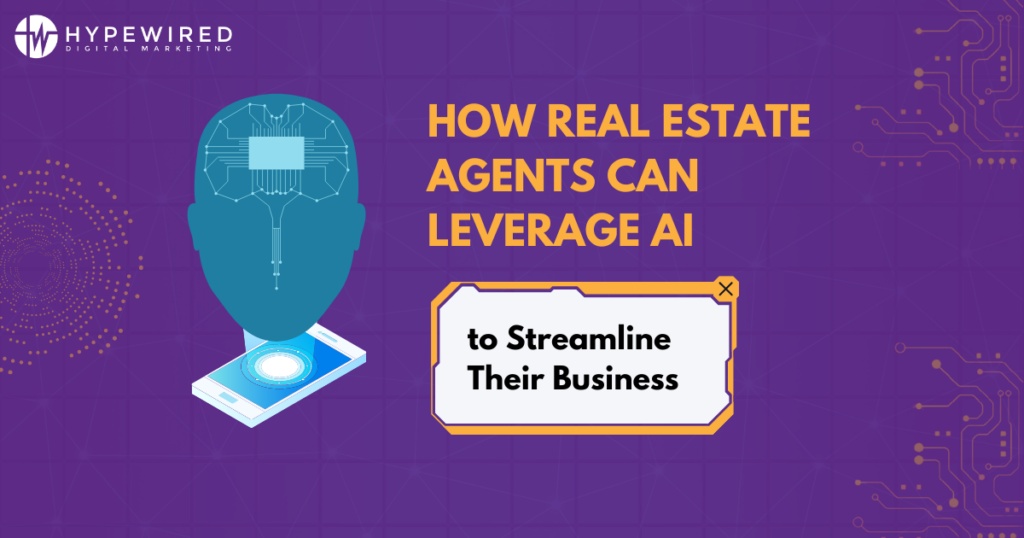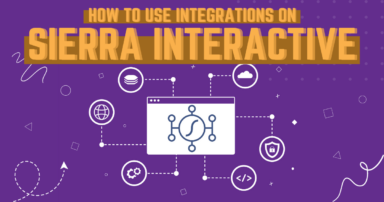Technology has become integral to success in the current real estate landscape. As such, savvy agents leverage artificial intelligence (AI) to streamline their business operations and create new growth opportunities. AI is quickly becoming a powerful tool in all areas of modern life, including the real estate market.
With its ability to automate time-consuming tasks and provide insights into customer behavior, AI can help agents stay up-to-date with industry trends while providing valuable data that helps drive decisions.Real estate professionals are beginning to embrace technology, allowing them to access actionable data points that could revolutionize how they manage properties or interact with customers.
Real estate lead generation has been turned upside down, and if an agent knows how to leverage technology, they can use it to their advantage. AI tools such as natural language processing (NLP), machine learning algorithms, and predictive analytics can be used to automate mundane tasks and respond to leads faster.
Real estate agents can use AI to make smarter decisions faster without sacrificing quality or service levels. Still, they must understand the capabilities of different AI technologies and best practices for integrating them into their business models. This article provides an overview of practical strategies for getting started with artificial intelligence in real estate markets and provides insight into some of the most promising applications currently available.
What Is AI Technology
AI technology is a rapidly advancing field that has the potential to revolutionize many aspects of our lives. It is an umbrella term for several disciplines, such as machine learning, natural language processing, deep learning, and robot process automation, that work together to enable machines to perform tasks once impossible. AI has been used in numerous industries, from healthcare to finance, and now real estate agents are looking at ways to leverage this powerful tool to streamline their business operations.
AI in the real estate industry can help agents increase efficiency by automating mundane or repetitive processes, analyzing customer data, and providing insights into user behavior. Machine learning algorithms can analyze customer data and make predictions, while NLP can interpret human interactions.
Deep learning allows computers to learn complex concepts without explicit programming, and robotic process automation reduces manual labor associated with administrative duties. These tools offer tremendous advantages for real estate agents to stay competitive in today’s market.
Benefits of Implementing AI Solutions
AI technology has the power to revolutionize how real estate agents do business. With AI solutions, agents can streamline their workflows and reduce costs without sacrificing the quality of service. AI automation offers numerous benefits for agents and customers, from cost savings to improved customer service.
In terms of cost savings, implementing an AI solution allows agents to cut labor-intensive tasks out of the equation. By relying on automated processes instead of manual labor, agents can save time and money while providing excellent customer service. Additionally, data-driven insights generated by AI systems can help identify trends in the market that could otherwise be missed with traditional methods.
Regarding customer service, AI solutions enable agents to provide faster responses and more personalized services. Automated chatbots and other AI tools allow agents to quickly address inquiries and focus on more complex tasks while giving clients top-notch service. Furthermore, AI algorithms can help predict the properties or services a client may need based on past searches or preferences, enhancing the experience.
AI systems can help real estate agents reduce labor, reduce costs, improve customer service, access data-driven insights, and save time. This creates an environment where innovation is embraced rather than feared, creating new opportunities for success in today’s competitive real estate industry.
Challenges of Integrating AI Solutions
When it comes to integrating AI solutions into real estate, several challenges must be overcome. Companies may find themselves caught between a rock and a hard place as they attempt to adopt this new technology. On the one hand, agents need to ensure that their AI integration is successful to stay competitive in an ever-changing market landscape; on the other hand, implementing such advanced technologies can be time-consuming and costly.
Agents must ensure all stakeholders understand the process of AI implementation, manage expectations, consider potential risks, educate clients, and consider both financial and operational costs when adopting an AI solution.
They should also analyze cost-benefit scenarios before investing in any particular toolset or platform and clearly understand the necessary resources. Proper planning ahead of time can help mitigate some of the more common pitfalls associated with technology adoption efforts within a real estate agency environment.
Examples of AI Solutions for Real Estate Agents
AI-enabled solutions can revolutionize real estate services for agents and clients. AI can streamline business processes, provide better customer service, and improve marketing efficiency for real estate agents.
Realtors can use AI technologies to analyze data to determine trends in market prices or identify desirable properties. Data science algorithms such as regression models and support vector machines can process large amounts of data quickly and accurately. AI-driven sentiment analysis tools can gain insight into customers’ feelings toward specific properties or developments.
Real estate chatbots powered by NLP technology make it easier for agents to respond quickly and accurately to inquiries from prospective buyers or tenants, enabling 24/7 availability and collecting information about prospects. By leveraging AI-powered chatbot technology, agents can save time responding to routine questions while focusing more on high-priority leads that require personal attention.
AI has opened up new possibilities for improving operational efficiency and the customer experience in the real estate industry. Agents now have access to cutting-edge technologies that enable them to make informed decisions faster than ever, allowing them to deliver superior services at competitive rates.
AI will continue to advance, allowing businesses to maximize their return on investment without compromising quality standards or customer satisfaction levels.
Strategies for Maximizing AI Adoption
Real estate agents must be strategic in their approach to AI adoption and implementation. The digital transformation of the industry requires agents to develop a comprehensive set of strategies for maximizing AI usage:
- Create an AI-Centric Workflow: Creating a workflow that leverages AI technology is essential for successfully utilizing automated solutions. Agents should create processes to implement efficient automation technologies into daily operations.
- Utilize Data Analytics Tools: Real estate agents can use data analytics tools to gain insights into customer behavior and preferences and discover potential opportunities for improving efficiency. This helps them make informed decisions when investing in new technologies or services.
- Engage with Technology Companies: Real estate agents should engage with leading tech companies to gain insight into emerging technology solutions and advice on implementing them into their business practices.
- Develop an Adaptive Mindset: Real estate agents must remain open-minded about different approaches and ideas when integrating new technologies into existing workflows or creating entirely new ones altogether.
Real estate agents must embrace innovative technologies like AI to stay competitive in today’s rapidly changing market.
FAQs About AI in Real Estate
What is the cost of implementing AI solutions for real estate agents?
The cost of implementing AI solutions for real estate agents can be a significant factor in determining whether to invest in such technologies. As the demand and interest in AI-powered tools grow, so do the costs associated with implementation. The exact cost of using AI will depend on several factors, including:
- The scope and complexity of the project
- Whether or not existing technology infrastructure needs to be updated
- How much customization is required
Real estate professionals should consider an AI solution’s potential costs and return on investment before committing to it. They should also consider resources and training or staffing requirements to implement and maintain an AI platform over time successfully.
Real estate agents should focus on providing tangible value to their organization by streamlining processes, increasing efficiency, reducing costs, improving customer service, and considering both up-front and long-term returns on investment when considering AI solutions.
How long does integrating an AI solution into a real estate business take?
Integrating AI into a real estate business is like watching the sun rise; it starts slowly and gradually grows in brilliance. The time required to incorporate an AI solution varies depending on complexity, scope, and implementation plan.
Establishing objectives and milestones ahead of time will help ensure smooth deployment while keeping costs under control. Leveraging AI solutions allows agents to optimize their processes and generate greater returns from their investments in no time flat.
What kind of training is required of agents to use AI solutions?
Real estate agents looking to incorporate AI solutions into their businesses may wonder what kind of training is required for them to do so. To ensure the successful implementation of an AI solution, careful consideration must be given to both the technical aspects of the technology and its practical applications.
There are several factors to consider when evaluating different types of AI training for real estate agents. These include comprehensive coverage of relevant topics, hands-on experience with specific technologies, and potential legal or ethical considerations for using artificial intelligence in a real estate business.
Agents should also seek mentorship opportunities from experienced professionals who have successfully leveraged AI tools for their business operations. This type of support can be invaluable when introducing cutting-edge innovations into any organization’s workflow processes.
Are there any legal or ethical considerations surrounding the use of AI solutions?
Various legal and ethical considerations must be considered when considering the use of AI solutions in real estate. Real estate agents must understand the potential legal and ethical implications before leveraging AI solutions to streamline their businesses. This includes researching applicable data privacy laws, ensuring compliance with fair housing laws, and considering any ethical concerns arising from leveraging artificial intelligence technologies.
Agents must be aware of all relevant laws and regulations while also considering any moral or ethical issues that might arise from implementing advanced technology systems. Agents must clearly understand legal and ethical requirements before utilizing AI tools to stay compliant with industry standards while maximizing efficiency within their organization’s operations.
Are there any AI solutions designed specifically for real estate?
The industry is rapidly evolving, and technological advancements, such as artificial intelligence (AI), are helping to facilitate this transformation. Real estate agents looking to take advantage of AI-based solutions should consider how they could improve customer service, data accuracy, and process automation throughout their organization.
AI tools used in marketing campaigns can help target potential buyers based on certain criteria; machine learning algorithms can provide accurate market analysis; and agencies can deploy automated chatbots to respond quickly to inquiries from customers and prospects. Adopting AI solutions offers many cost-saving benefits, allowing businesses to operate at peak performance without spending excessive resources on labor costs.
AI in the Real Estate Industry
AI solutions allow real estate agents to streamline their business by automating mundane tasks and simplifying complex processes. Understanding the legal and ethical considerations associated with using these technologies and any specific AI solutions tailored for their industry is essential.
AI could revolutionize how real estate agents do business, helping them achieve greater success through improved insights into customer behavior and more efficient operations—not to mention more time for growing a lead-producing real estate blog. Real estate agents have a unique opportunity to benefit from the power of AI technology and stay ahead of the competition.

 February 13, 2023
February 13, 2023



